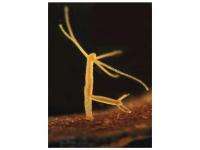Biologists sequence Hydra genome

UC Irvine researchers have played a leading role in the genome sequencing of Hydra, a freshwater polyp that has been a staple of biological research for 300 years.
In the March 14 online version of Nature, UCI biologists Robert Steele and Hans Bode, along with nine other UCI scientists and an international team of researchers, describe the genome sequence of an organism that continues to advance research on regeneration, stem cells and patterning.
The team discovered Hydra to have about the same number of genes as humans, sharing many of the same ones. Surprisingly, they also found genes linked with Huntington's disease and with the beta-amyloid plaque formation seen in Alzheimer's disease - two areas in which UCI has traditionally strong research programs - suggesting the possible use of Hydra as a research model for these two diseases.
"Having the Hydra genome sequenced also enhances our ability to use it to learn more about the basic biology of stem cells, which are showing great promise for new treatments for a host of injuries and diseases," said Steele, associate professor and interim chair in biological chemistry.
Started in 2004, the Hydra project is the first genome sequencing effort in which UCI scientists have played a major role. The sequencing was carried out at the J. Craig Venter Institute and was funded by the National Human Genome Research Institute.
Provided by University of California - Irvine

















